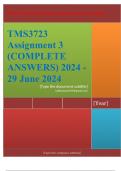100% TRUSTED workings, explanations and solutions
TMS3723
Assignment 3
(COMPLETE
ANSWERS) 2024 -
29 June 2024
[Type the document subtitle]
tabbymwesh59@gmail.com
[Year]
[Type the company address]
, Exam (elaborations)
TMS3723 Assignment 3 (COMPLETE ANSWERS) 2024 -
29 June 2024
Course
Teaching Life Sciences in Further Education (TMS3723)
Institution
University Of South Africa (Unisa)
Book
Methods of Teaching Life Sciences
TMS3723 Assignment 3 (COMPLETE ANSWERS) 2024 - 29 June 2024;
100% TRUSTED workings, explanations and solutions. ........for assistance
call @+254743275643
1. How does inquiry-based science education differ from traditional science
education? (20)
Inquiry-based science education (IBSE) differs significantly from traditional science education in
several fundamental ways. Here are the key distinctions between the two approaches:
1. Nature of Learning and Teaching
Traditional Science Education:
o Teacher-centered approach where the teacher imparts knowledge through lectures
and demonstrations.
o Emphasis on memorization of facts, concepts, and theories.
o Passive role of students as receivers of information.
o Limited opportunities for students to question, explore, and discover on their own.
o Assessment often focuses on recalling information through tests and quizzes.
Inquiry-Based Science Education (IBSE):
o Student-centered approach where students actively participate in the learning
process.
o Focus on fostering curiosity, critical thinking, and problem-solving skills.
o Students engage in questioning, investigating, and constructing their own
understanding of scientific concepts.
o Teachers act as facilitators or guides rather than primary sources of knowledge.
o Assessment includes not only factual knowledge but also process skills such as
inquiry, analysis, and communication.
, 2. Approach to Learning Activities
Traditional Science Education:
o Structured and predetermined activities set by the teacher.
o Experiments and demonstrations designed to illustrate concepts or principles.
o Emphasis on following procedures and obtaining expected outcomes.
o Limited room for student experimentation or modification of procedures.
Inquiry-Based Science Education (IBSE):
o Open-ended activities that encourage exploration and discovery.
o Students design and conduct investigations to answer their own questions.
o Emphasis on the process of inquiry, where students formulate hypotheses, plan
experiments, collect and analyze data, and draw conclusions.
o Encourages creativity and allows for unexpected outcomes, fostering deeper
understanding and critical thinking.
3. Role of Teachers and Students
Traditional Science Education:
o Teachers are knowledge providers and authority figures.
o Students are passive recipients of information, expected to absorb and reproduce
knowledge.
o Teachers guide and direct learning activities, often demonstrating experiments
and explaining concepts.
Inquiry-Based Science Education (IBSE):
o Teachers serve as facilitators or coaches, guiding students through the inquiry
process.
o Students take an active role in constructing their knowledge through exploration
and investigation.
o Teachers encourage questioning, support student autonomy, and provide
scaffolding as needed.
o Students learn to collaborate, communicate findings, and critique each other's
ideas.
4. Learning Outcomes and Skills Development
Traditional Science Education:
o Emphasis on content knowledge acquisition and mastery of specific scientific
concepts.
o Focus on preparing students for standardized tests and assessments.
o Limited development of critical thinking, problem-solving, and inquiry skills.
Inquiry-Based Science Education (IBSE):
o Focus on developing scientific literacy and process skills such as observation,
experimentation, and analysis.
o Encourages lifelong learning by fostering curiosity and a deep understanding of
scientific principles.




